Oscars 2020: Two Lesbians Discuss the Very White, Very Straight, Very Male 92nd Academy Awards
Usually in our friendship I’m the cinephile and Riese is the person making claims like movies aren’t good anymore. But this year Riese saw every single Best Picture nominee and I only saw four! We decided to talk about these movies, the Academy Awards, and why they matter… even as they constantly leave us disappointed.
Drew: So I want to start first with some backstory on myself which is that in 2018, I didn’t just see every Best Picture nominee I saw every nominee in general – even the shorts, even Boss Baby. Also as of 2018 I’d seen every Best Picture winner ever. The only one I haven’t seen now is last year’s Green Book because I just couldn’t bring myself to watch it. This is all to say that despite myself I’ve always loved the Oscars and tried to be very knowledgeable about them and the films nominated……… but this year I’ve seen almost nothing. And you’ve seen everything??
Riese: Yes, this is where I carried you. Why did you decide to abandon your film practice this year? Is it because you were busy watching A Perfect Ending? Too many bad lesbian movies in your life to make room for bad heterosexual movies?
Drew: It’s true that I did watch 195 movies last year and about 170 were about lesbians and beyond. But it’s really that MoviePass is extinct! The stakes are a lot higher when you’re deciding whether to pay $20 to see a movie about a bunch of old white guys.
Riese: Right I had screeners. They sent me movies in the mail “for my consideration” and I was like, ok I will consider them.
Drew: But also it’s not like I invited myself over to watch anything, so clearly cost wasn’t all of it. I think I’m tired! I was tired just talking to you about your viewing!
Riese: Right. When I was like “I’m gonna watch 1917 tonight” you were not like “Wait 4 me.”
Drew: I was not.
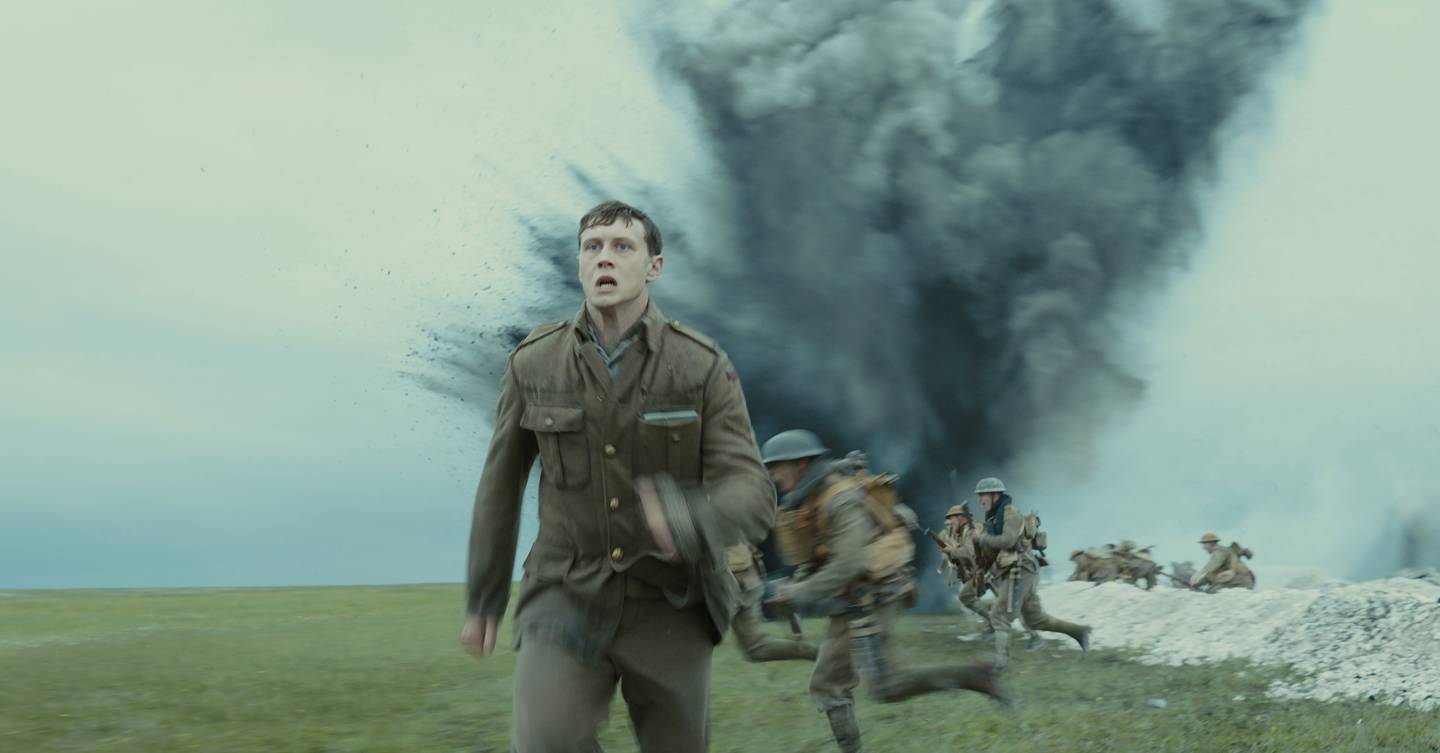
This is not a picture of Drew running over to Riese’s house to watch 1917
Drew: Do you usually watch all of the Best Picture nominees or was this year special?
Riese: I used to be a big film person! So like in the 90s I usually had seen all of them, yes. But as you know from my article “I Don’t Like Movies,” I sort of fell out of love with The Cinema in the mid-aughts and saw a lot less films. ALTHOUGH I think I often ended up seeing them, just later? I flew A LOT in 2017 and 2018, so I saw a lot of movies on planes.
But if I look at the 2016 nominees… all I saw was Hidden Figures and Moonlight. And like 25 minutes of La La Land before I decided i’d rather stand in my giant yard and stare at the sky praying for salvation.
Drew: Wow 25 minutes in it hasn’t even gotten really bad yet.
Riese: In 2017 all I saw was Lady Bird, Get Out, and Call Me By Your Name — and Get Out was the only one of them I’d seen prior to the Oscars.
Drew: So by the time you saw Lady Bird I’d already seen it twelve times
Riese: Yes. Last year I saw about half of them. The pattern seems to be that I really only watch movies that are about women, queer people, and/or people of color.
Drew: Shocking!
Riese: And this year reminded me of why that is.
Drew: I mean, that’s a big part of it for me. I spent so many years watching movies because they were on the AFI 100 lists or the Sight and Sound list and the vast majority of those stories aren’t just about straight white men but about straight white men who are violent.
Ignoring a lot of the successful mainstream movies doesn’t feel to me like limiting the stories I consume – it feels like finally widening them.
Riese: Yes, absolutely! If you were nominating 9 movies for best picture this year what would you pick?
[delay as I was thinking!!]
Riese: Are you going to nominate Frozen 2 nine times? A Dog’s Journey?
Drew:
Atlantics
The Farewell
Little Women
Pain and Glory
Parasite
Portrait of a Lady on Fire
Rafiki
Uncut Gems
Us
I think that is a good balance of movies I loved and movies that I think simply deserve this kind of recognition. I’m so mad Atlantics wasn’t at least nominated in the foreign language category!
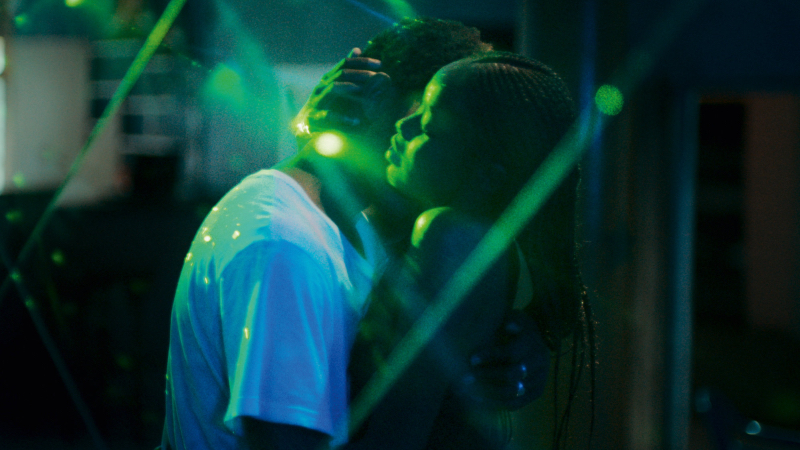
Mame Bineta Sane in Atlantics (2019) directed by Mati Diop
Riese: So the only overlap there is Little Women and Parasite, which were the odd ones out in this year’s list.
Drew: Definitely. But the only other two I saw were The Irishman and Marriage Story.
Riese: Honestly, like — in all tv and film awards — the nods and trophies usually go to white men from history. There’s something about something being set prior to the mid-20th century that gets Academy voters really hard. They like going back to a period of time when history has already sidelined all the women and POC for them and they can just really dig into some white male epics.
Drew: Right which is a shitty excuse because there are period pieces about people who aren’t straight white men and those get ignored.
Riese: Unless they’re about slavery!
Drew: I also think a lot about when something is considered an “Oscar movie.” Because a pattern I notice is when a boring movie about white men is nominated people say “Well it’s an Oscar movie!” but then when a movie that’s maybe not the best but very Oscar-y is made by women/POC it’s dismissed as “well it’s just mediocre.”
Imagine a movie like Birdman ever being nominated let alone winning if it wasn’t about a straight white man. That isn’t an Oscar movie at all!
Riese: I think boring white cis men like to see themselves represented. “I am boring and so is this movie,” they say to themselves. And then they vote for it.
Drew: Hahaha
Riese: I didn’t see Birdman.
Drew: Don’t. Even if two women make out randomly at one point
Riese: Honestly, sold.
Drew: It’s Naomi Watts and Andrea Riseborough! You can watch them make out with women in other better movies!

Michael Keaton and Edward Norton in Birdman (2014) directed by Alejandro G. Iñárritu
Riese: I did find that all of the best picture nominated movies were constructed in a digestible way. They had a very Hollywood feel to them where even if the subject matter was boring, you were carried through by a fairly formulaic procession of conflict and resolution.
Drew: So not like last year when there was the absolute incompetence of something like Bohemian Rhapsody? Which I actually didn’t see! lol
Riese: Drew, I have to tell you something.
Drew: Did you like Bohemian Rhapsody??
Riese: I liked Bohemian Rhapsody.
Drew: WHAT
Riese: :)
Drew: Wait sorry one second.
Riese: Yes.
Drew: Are you sure you didn’t mean that you love Queen? Because I also love Queen.
Riese: Mhm. I saw it on an airplane! And I thought, “Hm, not bad.” I mean I expected it to be really bad based on what I’d heard. I’d also heard they erased his bisexuality and that did not seem to be the case to me!
Drew: Wow, well as I said I haven’t seen it so I’ll let the internet have you on this one. But I am curious your takes on THIS YEAR’S movies.
Riese: Yes I’m ready. As a film expert.
Drew: Now I’m nervous knowing you liked Bohemian Rhapsody.
Riese: Feeling nervous is part of being alive.
Drew: Speaking of “Being Alive” shall we start with Marriage Story? Which I actually just watched this week.
Riese: Yes and you articulated all the things about it that I could not, to nobody’s surprise.
Drew: After making a big stink on twitter about how I was never going to watch it.
Riese: I also was vehemently not gonna watch it. However, I was engaged and emotionally invested in the film, I think because it sort of hovered above a world I am familiar with ’cause I grew up around it, which is “upper middle class artsy intellectuals.”
I thought it was very sad! I ended up just feeling sad about Adam Driver a lot. Sad on his behalf.
Drew: Yes!
Riese: My review of Marriage Story is: :-(
Drew: I said this on Twitter but I think it’s the problem with the movie. Baumbach and Driver create a really compelling and sympathetic character in Charlie and there’s a really great specificity there. The scene where he’s bleeding was my favorite moment in the movie. It was so sad and desperate and still really funny.
But everything with ScarJo was bland.
Riese: Yeah it felt like the film did not like her character, and then also; we don’t like her as a person, so.
Drew: The movie made a really compelling case that Baumbach was the sympathetic one in his divorce and I’m sorry but I’m Team Jennifer Jason Leigh.
Riese: She seemed a little harpy, and like she’d had all these problems with Adam Driver that she didn’t express and now she was expressing them and oo boi.

Adam Driver, Scarlett Johansson, and Azhy Robertson in Marriage Story (2019) directed by Noah Baumbach
Drew: But overall Noah Baumbach is good at writing and making movies. It definitely wasn’t a painful watch for me even if it was a tad boring. It’s very long.
Riese: If ScarJo had made out with Laura Dern I would’ve been like, “Ok this film is good.”
Drew: Really what the film is missing.
Riese: What all films are missing!
Drew: Laura Dern doesn’t make out with any women in Little Women either! Somebody send the Gerwig/Baumbach household a copy of “The Puppy Episode” stat!
Riese: I know, another bummer. We already have to deal with Jo March being allegedly straight, although your point that Laurie is actually a trans woman I think was overlooked by the film and deserves more attention.
Drew: Thank you. I agree. Also Jo March is not straight. Especially not in this version??
Let’s move to Little Women! Which I wrote an essay about so I’ll just get your thoughts.
Riese: I wish they’d had electricity.
Drew: During the Civil War?
Riese: Everything happened by candlelight and it was hard to see the film because the room I was watching it in had a glare coming in from the window.
Drew: This is why movies are better in theatres! Note: Riese watched Portrait of a Lady on Fire not in theatres and I haven’t been able to let it go because I’m annoying.
Riese: Wanna know what I did see in theaters this year ? You probably don’t.
Drew: Well we saw The Avengers: Endgame together. Is that it?
Riese: No, I also saw Cats.
Drew: Hahaha
Riese: And Once Upon a Time.………………. in Hollywood.
Drew: Which we’ll get to. But first other than the glare ruining the very nice cinematography… Little Women.
Riese: Right so Little Woman was good, obviously. All the women were good. I love women. I am a Jo March fangirl. Little Women was a big part of my life growing up. I took writing classes at the Alcott House when my family lived in Concord for a year.
But I mean for me nothing will ever replace the ’94 film which I felt was PERFECTLY cast with ALL my faves at the time.
Drew: Can I confess something
Riese: Obvs
Drew: There’s a moment in Marriage Story where Charlie says that when he’s at parties and people are talking about a movie he hasn’t seen he lies which is hilarious because of course Noah Baumbach does that. But I do not do that because I am not Noah Baumbach. So.
I have never seen the ‘94 Little Women.
Riese: Well if only it had won Best Picture.
Drew: Every white lesbian in their 30s I know is OBSESSED with the ‘94 Little Women.
Riese: Yeah it’s formative. It’s up there with A League of Their Own and Fried Green Tomatoes and Foxfire and Now and Then.
There was a big chunk of movies during that time period that all kinda had at least one of these people in them: Claire Danes, Kirsten Dunst, Christina Ricci, Thora Birch, Winona Ryder, etc.
Drew: Oh yeah for sure. A golden age of cinema with that bunch. Also this is going to get us off topic but FOXFIRE IS SO GOOD.
Riese: Yeah Foxfire is so underrated.
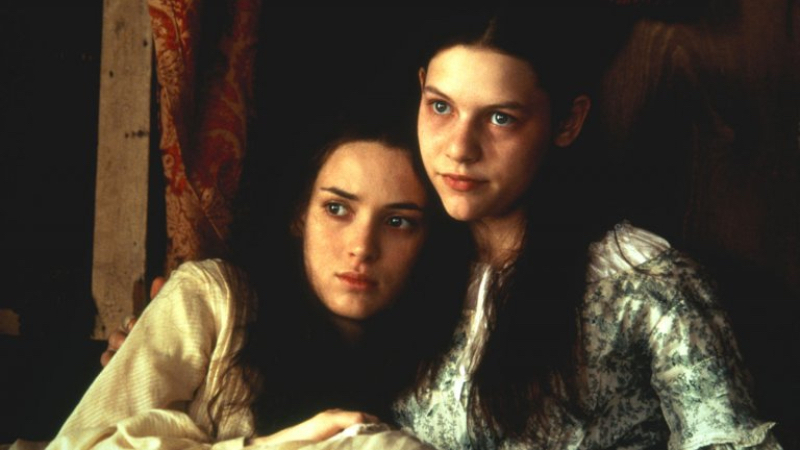
Winona Ryder and Claire Danes in Little Women (1994) directed by Gillian Armstrong
Drew: So with that in mind did you feel like Greta Gerwig’s film justified its existence? Despite your love of the earlier version?
Riese: Yes it did. There can never be enough Little Women.
Drew: They seem to make one every couple years so glad you feel that way.
Riese: Also I don’t think a film focused on a woman exclusively (like without being also focused on a man, e.g., Silence of the Lambs, Million Dollar Baby) has ever won Best Picture. Unless you count Chicago. Whereas films like 1917 that only have one woman in them for five minutes win all the awards.
Drew: Mrs. Miniver (1942). Sorry. This is who I am.
Riese: Oh! Terms of Endearment.
Drew: There are a handful. [Refinery 29 has a list of all 17 Best Picture Winners with Female Leads.]
Riese: Yeah I was just thinking post-1980 since those are the ones i am more familiar with. But also — All About Eve. The Sound of Music. We need more musicals I think. More musicals, less war!
Drew: I think a lot about the way men are portrayed in “women movies” vs. how women are portrayed in “men movies.” Like Little Women has some excellent male characters. Or closeted trans women in the case of Laurie.
Riese: It did.
Drew: But The Irishman certainly didn’t have excellent female characters. Marriage Story is supposed to be a two hander and that barely does! Women filmmakers tend to make space for men in a way that men do not for women.
Riese: Yes true.
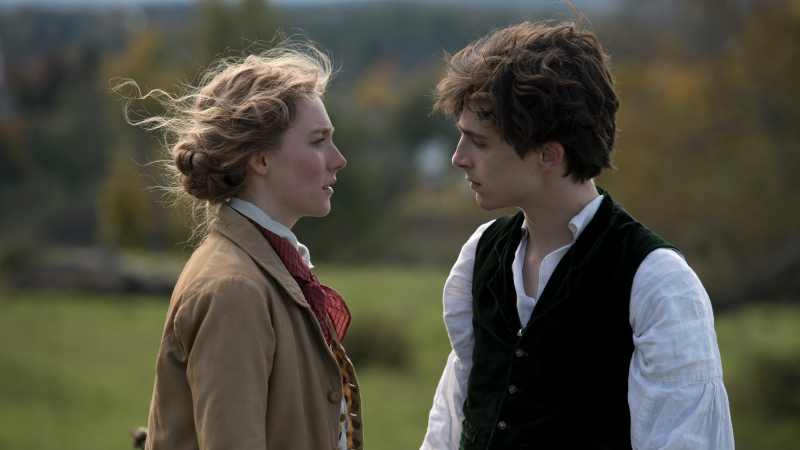
Saoirse Ronan and Timothée Chalamet in Little Women (2019) directed by Greta Gerwig
Drew: I’m sad that Greta didn’t get a directing nomination. The Oscars love an underdog story but never want to bring a not white man into their regulars club. I think a similar thing happened with Barry Jenkins not being nominated for If Beale Street Could Talk. It’s one thing to have this exciting newbie, but if they just become repeat Oscar nominees actual power would be shifted.
Riese: Right.
Drew: How do you watch If Beale Street Could Talk and not nominate it for everything?? How do you nominate Todd Philips over Greta Gerwig?? Racism and sexism IMO.
Riese: That is a fact. Not an opinion.
Drew: Yes.
Riese: They don’t view those stories as important. White men make history, uphold history, create history. What women/POC/queer people are doing is not seen as Important enough to be an Oscar Movie.
Drew: Unfortunately that’s true. Especially when people are telling their own stories. Regardless of what you think about the movie I bet if a white man had directed Harriet instead of Kasi Lemmons it would be nominated for Best Picture. Note: Kasi Lemmons’ debut was Eve’s Bayou, one of the best movies of all time, and her follow up The Caveman’s Valentine is wildly underrated, and she really should be making whatever work she wants to instead of biopics. Alas.
Riese: I thought things were shifting after the 2016 awards. I mean the past three years were better, representation-wise, than this year. It seemed like we were maybe getting close to the general realm of “somewhere.”
Drew: I think they are shifting. I think this is part of the shift. Green Book and Joker are aggressive choices. They are indicative of cis straight white men grasping for power.
Riese: HOW IS THE JOKER NOMINATED FOR BEST PICTURE
Drew: Let’s talk about it!
Riese: It is the WORST PICTURE.
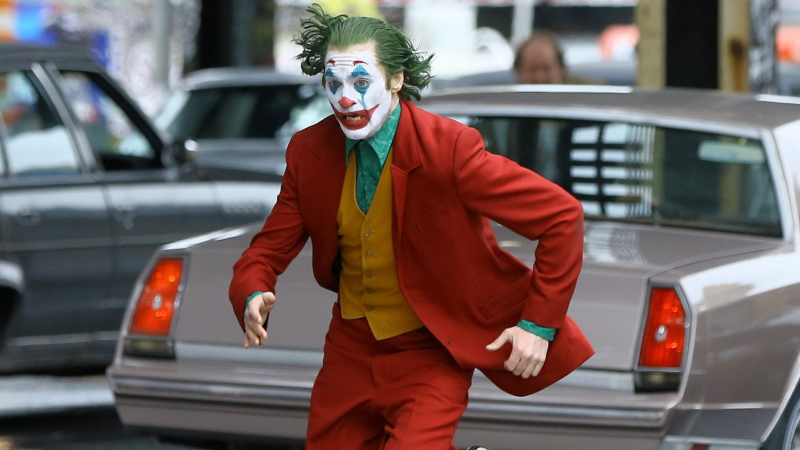
Joaquin Phoenix in Joker (2019) directed by Todd Phillips
Drew: This is the only one based on talking to you that you HATED.
Riese: Correct. Because it is horrible. First of all it seems like they’re basing its world on like, ’70s-80s Manhattan. It seems like they are drawing inspo from some actual incidents that happened in the 1980s in New York during this time period, but they shift the incidents to make POC the perpetrators of violence rather than the victims of it (you can read more about this in The New Yorker’s review of the film). It was deeply racist and misogynistic. And it said nothing! This white man is a terrible person who starts a movement by being nihilistic and killing people???? I guess????
What is the point of this movie I don’t know, who is it speaking for??? Comic book villains? Why is it being spoken at all???????? WHY ANYTHING?????
Drew: As a kid I had a Taxi Driver poster I bought at Blockbuster Video so I think I earned the right to not see Joker.
Riese: It just felt empty and irrelevant.
Drew: The only reason I’m happy about Joker being in the awards conversation is it has been such a joy to watch Martin Scorsese be aggressively dismissive of Todd Phillips. Like in the Hollywood Reporter Directors Roundtable, Phillips is talking about how the movie is a tribute to Scorsese and Scorsese just has so much contempt for Phillips.
It must be annoying to have your work copied and misinterpreted so aggressively! But also I think it calls into question the value of that original work. Which is what I think The Irishman is all about. I’m certainly not the first to say this but it feels like Scorsese grappling with the legacy of something like Goodfellas.
Riese: Yes the movie in which they CGIed Robert DeNiro to look like Robin Williams.
Drew: He’s supposed to be 25 in those early scenes! That’s younger than me! Nobody is younger than me!
Riese: That’s true, you’re the youngest person I know.
Drew: He looks 45 at best. But I do think it’s a well made movie. I saw it in theatres because I knew if I watched it at home I wouldn’t focus.
Riese: Yes, it was well done. That was a movie where I was like, they know how to make movies. And once I realized it was tied to actual history and not a made up story I was more invested.
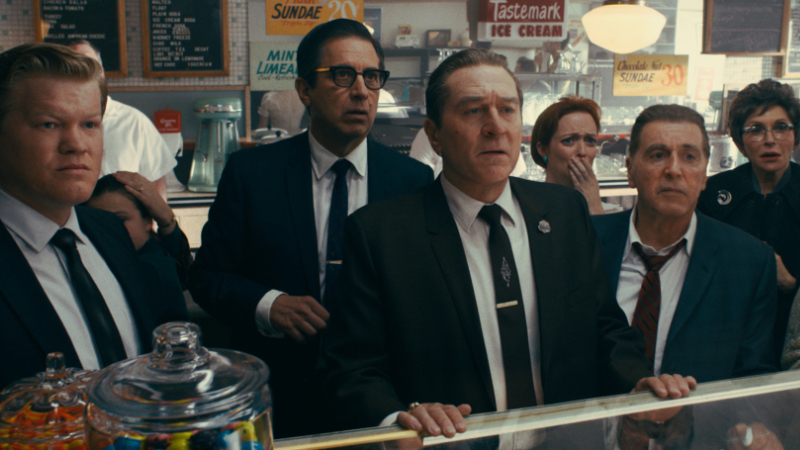
Robert De Niro, Al Pacino, and friends in The Irishman (2019) directed by Martin Scorsese
Drew: I do think Scorsese is one of the best filmmakers ever even if his subject matter doesn’t always interest me.
Riese: Generally mafia and gangster movies are a big snooze for me. And this wasn’t NOT a snooze but it was fine. I felt fine about it and understood why it would be nominated.
Drew: My favorite Scorsese movies are Mean Streets, Taxi Driver, The Age of Innocence, Bringing Out the Dead, and Hugo in case anyone was wondering!
Riese: Also I don’t think this one had anything new to say. The Oscars don’t want anybody to say anything new!!!
Drew: Speaking of nothing new and incredibly boring can we talk about Ford v Ferrari and 1917 at the same time?
Riese: Why because in both films there were two white men in romantic friendships?
Drew: Oh I didn’t realize there were two white men in 1917. I thought just the one guy running.
Riese: [SPOILER ALERT] Well one of them dies. But he dies pretty late in the film.
Drew: These are the two I’ve been least engaged in.
Riese: 1917 is like you go on a walk with two dudes you barely know for 3 hours. Which, I mean, is a nightmare.
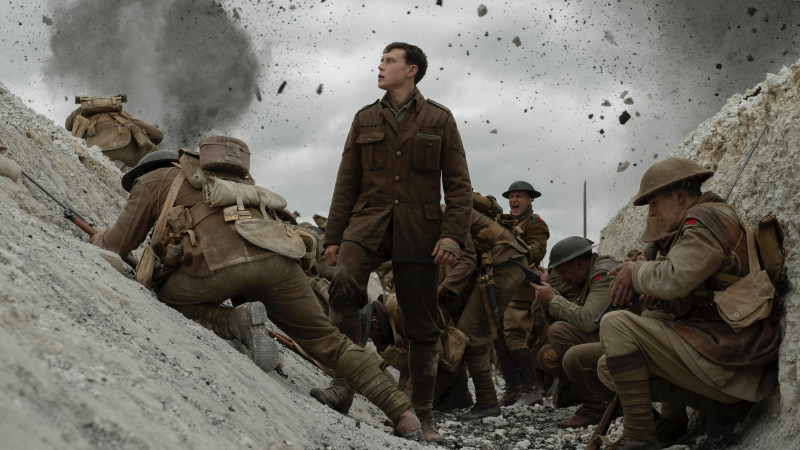
George MacKay in 1917 (2019) directed by Sam Mendes
Drew: I find the obsession around long takes to be so dull. If you want good cinematography watch what Claire Mathon did in Atlantics and Portrait of a Lady on Fire!
Riese: Well it also meant they had to create ENORMOUS sets.
Drew: Right…….. like I guess that’s sort of cool.
Riese: I watched a behind the scenes featurette and I know we can’t even begin to talk about the money spent on movies – we obviously cannot – but I was just like, wow they basically built an entire city here for an imaginary story when there are so many people who do not have houses to live in.
Drew: Yeah that is definitely another discussion!
Riese: They could’ve just dug a tunnel for an Upper East Side subway in Manhattan instead of digging that tunnel through the European countryside to get their one take. Give something back!
But the characters were empty. I think it got nominated because the one long take thing really got everybody all fired up and because white men are gay for war.
Drew: And cars.
Riese: I felt like I was at the movies with my grandpa during Ford v Ferrari. He’s dead but I kept looking around for him because I could not imagine another context in which I would watch such a film.
Drew: I know so little about this movie. I know it’s based on history but I don’t know the history. And I never saw a trailer. Can I guess what it’s about?
Riese: Yes. Just throw things out there.
Drew: Okay so Christian Bale plays… Mr. Ferrari. And Matt Damon plays… Henry Ford?
I feel like Matt Damon is too young on the poster and the cars look too cool. So maybe Henry Ford’s son! And the Ferrari is invented and everyone thinks it’s cooler than the old cars. So Henry Ford’s son (grandson?) is like wait a second we’re gonna make cool cars too.
And towards the end they meet and there’s a lot of sexual tension. But they don’t kiss. And ultimately they decide there is room in the world for both car companies?
Was this correct?
Riese: Ok here is what you got right: Henry Ford’s son is a character in the film. And there is a … competition of sorts around whose cars are cooler. Also you are right that they don’t kiss.
Drew: Bummer.
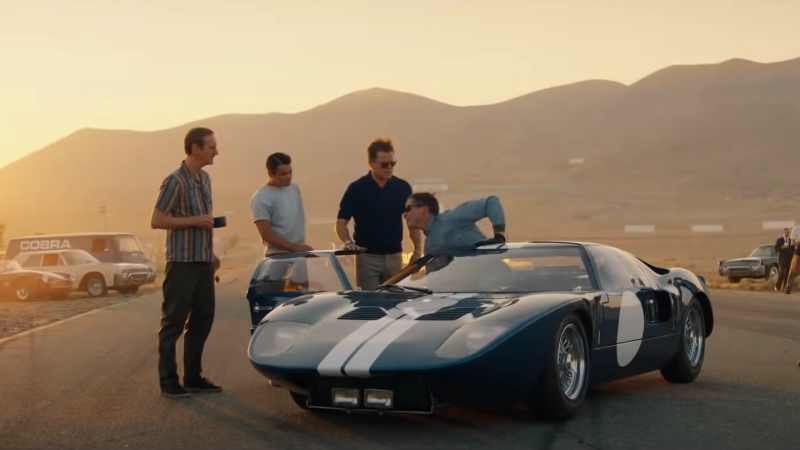
Matt Damon, Christian Bale, and a couple of their best friends in Ford v Ferrari (2019) directed by James Mangold
Riese: So basically Ford is losing market share and Ferrari is HOT HOT HOT and they also always win this big car race in France where you race for like 24 hours.
Drew: The Tour de France but with cars got it.
Riese: Right. What I learned from this film is that driving a car really fast is a sport that requires skill, something that has honestly always confused me. My whole notion of car racing comes from men in my extended family going to the Indy 500 and also Grease.
Drew: Car racing required skill (and heart!) in Grease.
Riese: So anyway Ford wants to win the race, and Matt Damon is who they hire to help fix it, and Christian Bale is like the best race car driver in the US!!!!!!! Even though he is BRITISH?!?!?!?! And guess what?!!!?! He has an … abrasive personality.
Drew: Wow!
Riese: And Ford is not SURE if he can REPRESENT their brand even though he is THE BEST RACER.
Drew: Oo tricky.
Riese: He’s great but they’re like NO we don’t want him on the podium!!!! Let’s kick him out. So they do and the other guy sucks so Matt is like “let my bf come back” and they are like “ok” and then he does and they all win.
Drew: And they don’t kiss after all that??
Riese: Except he doesn’t actually win because they ask him to hang back so all three Ford cars can cross at the same time which’d make a good photograph.
Drew: So he learns to be a team player. Despite that abrasive personality. A character arc if you will.
Riese: Mhm yes he takes one for the team. Then a few months later his car blows up and he dies. The end. Based on a true story!
Drew: Wow. Okay. Well, cool cars and sudden violence seems to take us to Once Upon a Time in Hollywood even though I’m dreading that discussion.
Riese: I saw that film in the theater because my friend was like “let’s go see it” and we all agreed to see it knowing nothing about it. I was imagining it would be about like, girls in Hollywood because Once Upon a Time makes me think of fairy tales which I think of as a female-centric genre. Listen the point is that it was VERY warm in the theater. Luckily I wore shorts but my friends were not so lucky.
Drew: I actually know very little about it. I never even saw the trailer. But I have seen every other thing Tarantino has ever done Including his CSI episode. I went through a Tarantino phase like the good film boy I was trying to be.
Riese: I have NEVER felt so confused during a film. Like a man would say a thing, and everybody would laugh except me. I did not understand why the jokes were jokes? They didn’t seem like jokes to me. It felt like a movie By Men 4 Men. I’m not sure why it’s so celebrated. I feel like it’s objectively bad and also ENORMOUSLY irrelevant. Again, it has nothing new to say. Why should I care about this aging Western movie star? Why are they rewriting the Manson story to make it less interesting?
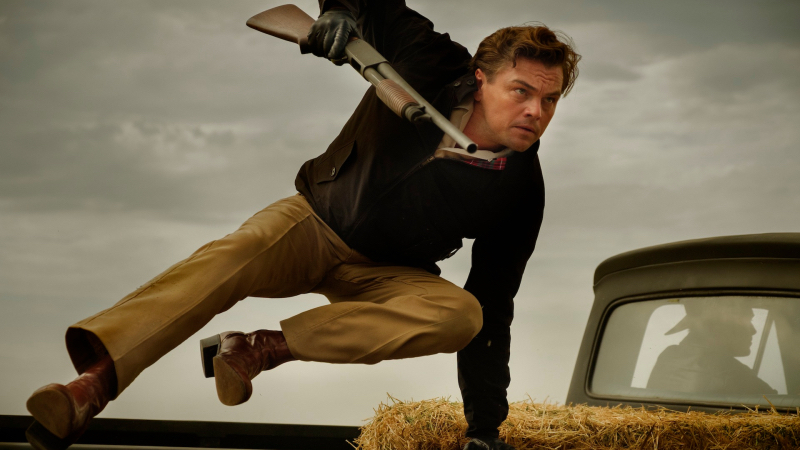
Leonardo DiCaprio in Once Upon a Time in Hollywood (2019) directed by Quentin Tarantino
Drew: I almost saw it many times. I didn’t actively boycott it. We don’t need to have a whole conversation about restorative justice but I really don’t know what I want from Tarantino. I think his on-set behavior and enabling of Weinstein has just resulted in me… not really caring about what he has to say as an artist?
Riese: I have never cared what he has to say as an artist because I hate violence in movies. I walked out of Kill Bill. Except I did like Four Rooms.
Drew: Lol what?
Riese: Yes.
Drew: You liked Four Rooms?
Riese: I mean, I don’t remember it super well. But I think I liked it. Great little cast. Jennifer Beals! Not as much violence. Fun musical score. And there’s a witch coven in it!
Drew: Your favorite Tarantino movie is the one co-directed by lesbian filmmaker Allison Anders who directed an episode of The L Word?
Riese: Yes.
Drew: This checks out. My favorites were Jackie Brown and Inglourious Basterds but I have no idea how they’d hold up because I haven’t seen either in years. I do think I’ll eventually watch this one. When it’s free.
Riese: Well let me know if you think it’s funny.
Drew: I will do that.
Riese: Like Leonardo DiCaprio would kill someone with a fire gun and everyone would be like LOLOLOL
Drew: Oh boy.
Riese: I was like, where am I? Take me back to The Basketball Diaries.
Drew: I miss old Leo so much wow.
Riese: He was such a cute lesbian.
Drew: It feels like next we should talk about Jojo Rabbit because that’s the other movie I planned on seeing but didn’t. Multiple people told me that I specifically would hate it?
Riese: Oh right I saw that one because my friend works for the company doing social media for it. And she was curious if i would find it offensive or not as a Jewish person. I did not for the record
Drew: I tend to be really picky with Holocaust movies. I hate Schindler’s List. And REALLY hate Life is Beautiful.
Riese: I loved Life is Beautiful.
Drew: Yeah that, Cinema Paradiso, and Forrest Gump are the movies I hate and can’t talk about or else I lose friends.
I think I always feel weird about Holocaust movies that try to be inspirational? I mean I love Chaplin’s The Great Dictator! It’s not that there can’t be humor! It’s more that I don’t like the sentimentality of those other films.
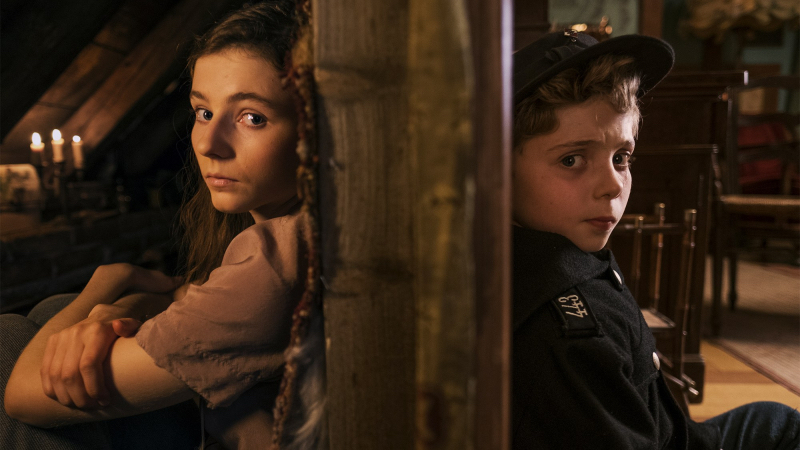
Thomasin McKenzie and Roman Griffin Davis in Jojo Rabbit (2019) directed by Taika Waititi
Riese: I liked JoJo Rabbit. It was fine. It had a visual style I appreciated and a tone that obviously took more risks than we generally see in Oscar bait. ScarJo is always like in things though, and that’s tough.
Drew: I like Taika Waititi and I would’ve been more eager to see it if ScarJo wasn’t in it! But also the actress from Leave No Trace (Thomasin McKenzie) is in it and she’s great. That movie should’ve been nominated last year and she should’ve been too.
Riese: It’s interesting that there were a lot of actors who showed up twice during this Best Picture Expedition of mine. I saw ScarJo, Al Pacino, Robert DeNiro and Laura Dern twice. And I saw every black actor in the universe say lines zero times.
Drew: I’m still so mad Lupita Nyong’o wasn’t nominated for Us.
Riese: In Joker, his social worker was a black woman, as was a woman who lived in his building who he had an imaginary relationship with. I think that was it.
Drew: Well this brings us to the last movie and the only movie not about white people: Parasite. I don’t like Parasite quite as much as most, but I do think it’s really good and I’m pulling for it on Oscar night.
Riese: It’s also the only movie about the present.
Drew: Because Joker is mimicking the 70s and 80s and Marriage Story takes place in 2013 when Noah Baumbach was getting a divorce from Jennifer Jason Leigh. A period piece.
Riese: lol.
You’re right, Marriage Story and Parasite are both about the present.
I liked Parasite. I thought it was interesting and engaging. I hope it wins. I really think we should be expecting our Best Picture nominees to have something new to say. And you can do that with movies about the past. But I don’t think any of these movies got there.
Drew: That’s interesting because I think Little Women has more to say about the present than Marriage Story. Even if Greta Gerwig’s vision is rather limited as much as I do love her and the movie.
Riese: Yeah you are probably right about that. Here’s the thing!!! There’s a lot more NEW things to say about women/POC because our stories are told less often. These categories should be dominated by movies about women/POC that are written / directed / produced by women and POC.
Drew: Yes! It’s why my decision to watch more movies not about straight white dudes results in me seeing much better movies. Except A Perfect Ending.
Riese: I think even within the world of what Oscar voters tend to get into, Pain and Glory deserved a spot over Joker.
Drew: Yes! I loved Pain and Glory so much.
Parasite is the first movie not in English that my sister has ever seen in theatres without me. Ever! So I do think it’s really exciting how it’s gained mainstream success and attention. I would love if this could be reflected in future years. Because so many of the best films I saw last year were not in English.

Choi Woo Shik, Song Kang Ho, Chang Hyae Jin, and Park So Dam in Parasite (2019) directed by Bong Joon Ho
Riese: It feels like they max out on one (1) foreign film being nominated.
ALSO one important thing about that film specifically that I am aware of because of this piece I did in 2016 (Note: Riese updated this piece through 2020) is that historically when the academy HAS nominated a film about Asian people for Best Picture, they never nominate any of the actors. Whereas nine white actors have been nominated for playing Asian characters. And three won.
Drew: I just audibly sighed.
Riese: Five films with majority-Asian casts have gotten Best Picture nods but zero acting nods: The Last Emperor, Slumdog Millionaire, Crouching Tiger, Hidden Dragon, Life of Pi, and Letters from Iwo Jima. Now Parasite is six.
Drew: It’s incredibly frustrating when people claim the acting categories are so white this year because there just weren’t the performances. As if the entire cast of Parasite wasn’t fantastic. They won the SAG ensemble award!
Riese: They did.
Drew: Also Awkwafina feelings aside she should’ve been nominated for The Farewell. And Alfre Woodard for Clemency. And JLo for Hustlers AND Constance Wu for Hustlers to be honest. And AGAIN Lupita for Us. There really are no excuses.
The sad thing is the Oscars do matter. They determine what movies get made and how people’s careers progress. So as tempting as it is to just dismiss them as an outdated award show… I never seem to be able to.
Because I know that if Lulu Wang got an Oscar Nomination it would change her career. And I want her to make everything she wants!
Riese: Yeah and honestly also this is a smaller thing maybe? But it really sucks for these individuals and their senses of self. Getting an Oscar probably feels really great!
Drew: I’d love an Oscar! I was voted most likely to win an Oscar in my high school superlatives. But they didn’t know I was trans yet.
Riese: Hahaha
Drew: I’d really love to be the third trans woman to win a Best Director Oscar. But if I have to be first I guess I will be. SIGH
Riese: lol
I’m a completist, but I think the other reason I watched all these films is to get a temperature on the mainstream? Because I feel very out of the mainstream with the work I do. For example, Blockers was nominated for NOTHING last year!!
Drew: Blockers is better than most Best Picture winners!!!
I think it’s really important that we both understand the impact the Oscars have while pushing them to be better and make sure they don’t completely determine the work we see and celebrate.
Like I certainly understand wanting to be part of the conversation. But I just think post-Oscars no matter who wins people should watch Atlantics. It’s on Netflix. Trust me.
But Riese you did see everything so if someone wanted to watch a handful of the films which would you say are worth their time?
Riese: Little Women. Parasite.
Drew: Yay! I already did it!
Riese: I enjoyed Bombshell even though I recognize that objectively it has a lot of problems!
Drew: Is that the only movie with lesbians nominated for anything?
Riese: I mean in my fantasies, Janelle Monáe’s character in Harriet was a lesbian but lemme see…
Laurie, the trans woman in Little Women, is a lesbian.
Drew: Of course!
Riese: It seems like there should’ve been a lesbian in Judy but I can’t think of one!
Drew: SIGH
Well maybe someday there will be an on-topic reason for Autostraddle to do some proper Oscar coverage. But until then I’ve enjoyed this conversation immensely and learned a lot, for example the plot of Ford v Ferrari.
Riese: Thank you. I enjoyed getting to hear about film from somebody who had genuine opinions and wasn’t just a girl on a sofa.
Well, I guess you’re also a girl on a sofa. But with a film degree.
Drew: And sometimes I sit in actual movie theatres.
Riese: Right!
Drew: Like next week when I’m sitting in a movie theatre with you making you rewatch Portrait of a Lady on Fire which gets its official release on Friday.
Riese: Well, I do love popcorn.
We implore you to check out The Brittani’s, a much better award show.
Greta Gerwig’s “Little Women” Gave Me Permission to Be Sad
This essay contains spoilers for Little Women (2019)
Three months after my ex and I broke up we tried to begin a friendship. We cautiously shared information about where our lives had gone in the quarter of a year apart.
I talked to her about my new home, my new friends, my new job. She talked to me about the person who would eventually be her new girlfriend. My desire to date as a woman and a queer person was a major reason for our breakup. And yet in our time apart I’d focused on my writing. I told her I was happy with my successes but I also felt really lonely.
“You were always lonely,” she reminded me. “Even when we were together you were always lonely.”
All I typed back was, “Oof.”
The first time I watched Greta Gerwig’s Little Women I judged not on a scale of quality, but on a scale of queerness.
In 2019 the only justification I could find for a seventeenth (yes, seventeenth) screen adaptation of Louisa May Alcott’s book about four white sisters living through the Civil War was if Jo March’s queerness finally went beyond subtext.
The casting of Saoirse Ronan had given me some hope, as did a comment Ronan made about this adaptation exploring new aspects of Jo’s character. While she isn’t out, I’ve long assumed Ronan is queer, which may simply be a misreading of deep-seated Catholic sexual repression.
But nothing about Gerwig implied that she’d queer the story – especially as the release date approached and the awards narrative became all about her partnership with Marriage Story director Noah Baumbach. Little Women is about a stubborn girl who won’t marry and all the press wanted to talk about was the directing power couple’s shared custody of Laura Dern.
This is all to say I was incredulous when I first watched the movie in October.
It turned out that Gerwig did queer the story.But by the end I’d abandoned my initial scale of judgement. Because the most remarkable thing about Gerwig’s film isn’t that it leaves room for queerness – it’s that it leaves room for sadness.
My birthday is on Christmas Eve and it’s been on Christmas Eve every year since I was born.
I’ve always insisted that I like sharing my birthday with Jesus and Santa. I’ve never had to be at school or work, there are so many pretty lights, and everyone is always celebrating. They aren’t celebrating me of course, but who really cares. People are happy and that makes me happy.
But this year I wanted more. The thought of spending yet another birthday doing Jewish Christmas with my family felt wrong after a year defined by finally allowing myself to be a little selfish. I hadn’t been back to New York since moving a year prior and I wanted so badly to go and visit my friends – and maybe experience a bit of closure with my home of seven years and my ex of three and a half.
My mom, ever the Marmee, has always been good at recognizing the needs – and wants – of her very different daughters. She offered me a plane ticket for my birthday, and when I gratefully accepted, she seemed confused yet unsurprised that I’d chosen New York over the easy comforts of a holiday at home.
I texted my ex and asked if she’d like to get lunch when I was in town. We still hadn’t quite figured out how to be friends, but it seemed absurd that we’d be in the same city and not see one another. She said yes, and then, a month later, said no.
At first I felt guilty – I couldn’t believe I hurt her so deeply that she still resents me almost a year later. And then I felt angry – she’s been in a new relationship for most of that year yet isn’t willing to work through whatever emotions would allow us to be friends. But, ultimately, I had to concede that sometimes no one is wrong and a situation is just sad.
The next day I flew to New York. I looked out the window as we began our descent, but there was too much fog to see the skyline. We landed with the usual thud.
The first time you watch Gerwig’s adaptation, it seems like she’s beginning with Friedrich Bhaer. Jo is in New York working on her writing and she meets the man who in other versions will be her husband.
The framing device doesn’t simply alter the timeline of the story. It elevates Bhaer’s importance so his usual tacked on feeling – requisite third act husband – disappears and his role as Jo’s One True Love begins to take shape.
It’s maddening and devastating and the impact of these emotions makes what’s actually going on all the sweeter. Gerwig has removed the requisite husband altogether. His role in the original story is made just that – a role in a story, a compromise with Jo’s publisher.
This twist ending doesn’t just allow for Jo’s queerness, but also her romantic solitude. On a second viewing, it’s clear that the framing device doesn’t result in the story starting with Bhaer. It results in the story starting with Jo’s writing.
Greta Gerwig’s Little Women joins a quickly growing body of work – Frances Ha, Mistress America, Lady Bird – where women are given love stories beyond romance. These are love stories about friendship, family, home, one’s self, and, of course, one’s art.
The thing about being a writer is every experience is an essay or a story or a film. The other thing about being a writer is when you’re traveling every work of art feels like a part of the trip. This isn’t by chance. It’s manufactured and then the happy accidents are allowed to fall into place.
I decided to finally read Rita Mae Brown’s Rubyfruit Jungle, because I knew part of it took place in New York. But I didn’t know it was about an NYU film student. That was a happy accident.
I walked by the Tisch building where Brown’s protagonist Molly and I both studied and I paused at Broadway and Waverly remembering my ex and I’s first kiss. Then I went home and read a break up scene written for me despite the novel’s publication pre-dating my birth by twenty years.
Molly has been dating a woman named Holly who is vivacious and bold and also painfully practical. Holly has a sugar mama and wants Molly to do the same. She tells Molly that women aren’t allowed to be film directors. She tells Molly she’s “gonna fight the whole world and get nothing but kicked in the ass.”
Molly is incensed. She yells back that she’s going to make movies and she’s going to make the kinds of movies she wants to make even if it takes decades. Holly concedes that part of her problem is she simply doesn’t have Molly’s spirit. Yes, she can’t stand to watch Molly struggle, but she also can’t stand the reminder that she won’t do the same.
“So what the hell am I supposed to do?” Molly asks. “Give it up to make you happy? Be a failure, so you can feel good about yourself?”
Holly doesn’t want that. She just wants to tell Molly she loves her and then disappear forever. Some people weren’t meant to be artists. Some people weren’t even meant to date them.
Little Women is not just about an artist. It’s about a family of artists. Gerwig’s version underlines each of these pursuits.
Meg is an actress. Or, at least, Jo thinks she’s an actress. Meg finds joy in doing Jo’s plays, but the possibility of anything beyond that never occurs to her. Jo wants Meg’s desires to mirror her desires, but Meg insists that just because her dreams are different doesn’t mean they’re less important. Jo replies, “I just hate that you’re leaving me.”
This is the source of Jo’s loneliness. It’s not that Meg is literally leaving, it’s that she’s leaving behind Jo’s dream and with that emphasizing its rarity. It’s less that Jo has different goals and more that Jo has different values. It’s more that Jo is different.
Beth is a musician. The only want we ever see in her brief life is to play music. It is her passion and also merely a hobby. Playing music brings her happiness and peace and she’ll take that when she can. Jo has big goals, ambitions, a desire to live and live and live and then keep living through her work long after death. Beth is content simply to die.
Amy is a painter. She’s the only other March sister to approach Jo’s level of ambition. As a child she wishes to be the best painter in the world and as a young adult she accompanies Aunt March to Paris with that goal still in mind.
She quickly gives up. She compares her achievements to Jo’s and says that she’s realized she lacks genius. “I want to be great, or nothing,” she says. And so, after a life of dreaming, she falls back on more practical plans of marriage and society.
What Amy fails to understand is the patience that goes into genius. The reason why Jo succeeds as an artist isn’t because she has more natural talent than Amy. It’s because she keeps trying.
Amy wants to be the best, but you become the best by insisting you’re the best, or, more importantly, insisting that maybe someday you could be the best. You become the best by having no choice but to keep going.
Amy has the choice to stop. Jo does not. And that’s why Amy can marry Laurie and lead a happy life and Jo, unfortunately and fortunately, cannot.
One night in New York all my friends were busy so I decided to go see Agnès Varda’s Vagabond at Film Society of Lincoln Center.
The theatre is in the same building as Juilliard where my ex went to school for acting. This place had consumed our relationship. It was her second home – a place for social gatherings, continued creative work, life-saving day jobs, and even, for one day, a memorial service. It was also a reminder of the past and all the futures not achieved.
As I walked from the subway to the theatre I became aware that it wasn’t just Juilliard that reminded me of her but the entire area. Columbus Circle to 72nd St. belonged to my ex and our relationship and the past. I held my breath expecting to run into her as if my memories could materialize and tap me on the shoulder.
Vagabond is about a woman named Mona – a drifter – who dies outside in the cold. We follow her travels in the months leading up to her fate as she hitchhikes and scavenges and finds brief moments of connection.
This life falls somewhere between circumstance and choice. I always remembered Mona as poor, but this viewing I was struck by the decisions that accompany her poverty. A middle class existence seems possible for Mona. Even within the brief months we see, she is given opportunities to settle down. But she isn’t satisfied with the possibilities allowed to a woman of her class. She’s unwilling to do work she finds dull and she’s even less willing to be tied to other people if it conflicts with her autonomy.
She meets a shepherd with a family who explains that he chose a middle road between loneliness and freedom. “You chose total freedom but you got total loneliness,” he tells her. He says this is unsustainable and we know, unfortunately, he’ll prove to be right.
But Vagabond is not simply a tragedy – it’s a tribute. For all its melancholy, Varda is too enamored with Mona – too similar to Mona – for it to be anything else.
The most pivotal scene in Gerwig’s film – the scene that has been memed on Twitter, the scene that will inevitably be used for Ronan’s Oscar campaign, the scene I’ve thought about every day since October – occurs after Beth’s death. Jo is still home. She’s lost in her writing and lost in her life.
We’ve just watched a scene from the past. We’ve watched as Jo confidently turned down Laurie’s desperate marriage proposal. But years gone by Jo’s certainty has faltered. She tells Marmee that she wonders if she made a mistake in turning down Laurie.
“I just feel like women – they have minds and they have souls as well as just hearts. And they’ve got ambition and they’ve got talent as well as just beauty. And I’m so sick of people saying that love is all a woman is fit for. I’m so sick of it! But I’m – I’m so lonely.”
Long before I knew that I was a stubborn woman, I was obsessed with the stubborn women of literature. The first time I read Jane Eyre I walked into English class buzzing like I had a class crush. But so often these characters are idealized. It’s not that their choices seem easy, but the difficulties are always external. The whole point is that they’re unwavering in their commitment to self.
This moment in Gerwig’s film doesn’t take away from Jo’s commitment. She may have doubts, she may feel lonely, but when presented with moments of choice she chooses herself. It’s barely even a choice. It’s simply what she must do.
The “But I’m – I’m so lonely” rang in my ears, but when rewatching the scene I was also struck by a line that comes right before the monologue.
Jo says that she wishes Laurie would propose again and Marmee asks if she loves him. “I know that I care more to be loved,” Jo says. “I want to be loved.”
Jo longs for companionship the same way Amy longs to be a great artist. The desire is real and the unfulfilled carries with it an air of melancholy. That’s the secret about stubborn women in literature and life. It’s not that we refuse to settle. We just settle differently.
If the March family house presents an idealized family unit, then there’s an apartment on Kosciuszko Street that’s my March family house.
Within this four bedroom Bed Stuy apartment lived my first group of out queer friends: Laura, Daniel, Kelly, and Caroline. Even when I was living in a cute one-bedroom with my ex, I felt like Laurie, longing for their queer household.
Well, on the eve of Kelly and Caroline moving out, I got my wish. Amidst all my nostalgic, ex-obsessed melancholy, this is where I stayed in New York.
On Christmas morning we shared a joint – the warmth of a fireplace inhaled into our guts. There wasn’t a tree or a feast and only a handful of presents, but we were very high and we had each other and it was perfect.
That night Laura and I had Christmas dinner at Nitehawk cinema. We went to see Little Women.
This time around I left the theatre thinking not of Jo’s loneliness, but about all the love in Jo’s life – and all the love in mine.
What separates Jo from Rubyfruit Jungle’s Molly and Vagabond’s Mona is she’s not completely alone. She has her family and her friends. Even if nothing lasts forever – childhood ends, people move out – we can cherish those we love and do not control. It’s not a cure for loneliness in the way of a traditional life, but it’s deeper and more important.
There’s a scene in Greta Gerwig’s previous movie where Lady Bird surprises Julie on prom night. She’s ditched her terrible date and wants to go with her best friend instead. She notices that Julie’s been crying and asks what’s wrong.
“I’m just crying,” Julie says. “Some people aren’t built happy, you know?”
And then we cut from this heartbreaker of a line to Julie laughing. Or, as the script says, laughing really hard.
Maybe it’s not that some people aren’t built happy. Maybe it’s that for some people happiness isn’t a state of being, but a fleeting moment. Maybe it’s that for some people happiness will always be a pleasant surprise, rather than the ultimate goal.
Since transitioning I’ve recoiled at the suggestion that this was all for happiness. People say whatever makes you happy, or if you’re happier then it’s worth it. But I didn’t transition so I could be happier. I transitioned so my sadness could feel like my sadness instead of somebody else’s.
I guess that’s the thing. This has nothing to do with queerness and everything to do with queerness. This has nothing to do with being a woman and everything to do with being a woman.
I am queer. I am a woman. I am an artist. And sometimes I am so, so sad.
Nothing brings me greater joy.